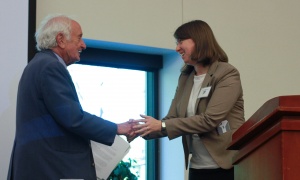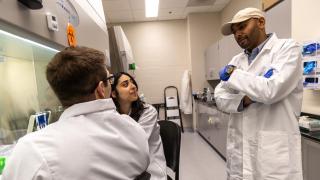
 Assistant Professor Harmony Reppond, right, greets Rep. Sandy Levin (D-9th), who spoke at the UM-Dearborn hosted summit, Campus Pantries Feeding Students: A Discussion of Food Insecurity of College Campuses.
Assistant Professor Harmony Reppond, right, greets Rep. Sandy Levin (D-9th), who spoke at the UM-Dearborn hosted summit, Campus Pantries Feeding Students: A Discussion of Food Insecurity of College Campuses.
One student approached her after class, asked for more information, and then went directly to the pantry.
“The student shared how they had to choose between buying supplies for school and buying food. This student was choosing classes to take based on textbook costs and shared that they actually dropped a class because their budget wouldn’t allow both food and that class’ textbook,” said Reppond, noting that students aren’t always aware of the campus pantry, which has been in the University Center since 2013. “I’ve learned that this is not a unique situation either.”
Reppond is part of the UM-Dearborn-based College and University Pantries (CUP) research team, which is looking at the rising number of food pantries cropping up on college campuses in Michigan and around the nation.
The interdisciplinary team has formed to examine patterns of food insecurity on U.S. campuses, determine how pantries affect student outcomes and identify effective related interventions to address cross-cutting socioeconomic issues faced by students.
CUP research team members are Reppond, Health and Human Services Assistant Professor Natalie Sampson, Sociology Assistant Professor Carmel Price and Social Studies Associate Professor Karen Thomas-Brown, along with student research assistants Asma Al-Khshali, Samyka Aloyo, Monica DeRoche and Teia McGahey.
When they first looked into the subject in 2014, the CUP research team found that nearly 150 campuses across the country had pantries registered with the College and University Food Bank Alliance (CUFBA) at the time. Looking to major university publications and social science research, they also found that there was very little data on why this was occurring.
With that discovery, the CUP research team started examining “Food insecurity and the role of food pantries on college campuses.” The team has conducted interviews at food pantries around the nation, but mainly focusing on Michigan, talking with pantry directors, volunteers and students who use the pantries.
Their research has been funded through a MCubed grant, an Office of Research and Sponsored Programs grant, and an Office of Metropolitan Impact grant.
Since they’ve begun, the number of campus-based food pantries registered with CUFBA has more than doubled—there are now more than 350-registered food pantries, with additional pantries in various development stages.
“Looking at both collected data and anecdotal information, we see that many low-income students, many who are the first in their families to attend college, are struggling to afford both tuition and living expenses. The average college student age is also increasing. More and more students seeking a college education are nontraditional, and some have families to support,” Sampson said. “There may be income-based programs to support tuition, but many students are ineligible for federal food assistance programs.”
The team says early data collected shows a consequence of this economic struggle is the expansion of food insecurity among college students. But what factors are at play?
To further examine this, the team recently held a summit with 16 Michigan public community colleges and universities. Speakers included Rep. Sandy Levin (D-9th), CUFBA co-founder and co-director Nate Smith-Tyge, Deputy Director of the Food Bank Council of Michigan Kait Skwir, Associate Director of the Women’s Center at Grand Valley State University Sharalle Arnold, and Chancellor Daniel Little. Rep. Debbie Dingell (D-12th) was also in attendance.
“We wanted to bring together different colleges and universities from across the state to facilitate a conversation among the schools to network and learn from each other on the subject of food inequity and solutions, like food pantries,” Price said.
“As researchers, we also wanted to collect their challenges and successes in data form. Since little exists at this time, it’s important to process and analyze the data to do scholarly academic publications, which can contribute to an understanding of food insecurity on college campuses and the efforts to address food insecurity.”
Price said data is needed to approach food insecurity in a more systematic way—to affect public policy, justify a reason for grant money and quantify a need if a campus wants to start a pantry.
In addition to collecting research, the team wants to bring awareness to this concern of food insecurity.
“We’ve found this dichotomy—either people are very aware and are doing something to help, or they are surprised to find out that this is an issue for college students. There isn’t much of a middle ground,” said Price, who noted that when the data collected at the summit is processed, the CUP research team would share findings with the summit’s attendees, campus staff and administrators and interested legislative policy makers.
“We know food insecurity is a reality for many college students on our campus, in the state and throughout the nation. We are looking at ways to put data, reasons, solutions and education with that realization.”




